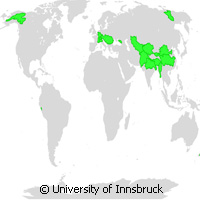Scientists investigate human dependence on glacier melt
Glaciers in large, mountainous regions play a critical role in the supply of water found in populated areas, but some regions are more dependent on melt water than others, new research shows. The study, presented in the journal Proceedings of the National Academy of Sciences (PNAS), was conducted by glaciologists and climatologists at the University of Innsbruck in Austria. The researchers collected data on the amount of precipitation on specific glaciers and determined when the water is eventually discharged and available in populated areas. Targeting the entire river basin region of glaciers in the Himalayas, the Andes, the Caucasus Mountains, Siberia, North America and New Zealand, they drew on international temperature and precipitation data as well as information from the World Glacier Inventory and the Global Digital Elevation Model. 'There is a big difference in whether the water is discharged in an arid period or in a period when there usually is a lot of precipitation,' explained study co-leader Dr Ben Marzeion from the Institute of Geography at the University of Innsbruck. 'And there are regions, for instance around the Aral Sea, where precipitation happens in the mountain regions in winter. The glacier melt water runoff in summer is vital for the population living in this area.' Glacier melt is often essential for local populations. The study highlighted how communities residing in mountain areas depend heavily on glacier melt water despite the fact that the actual number of inhabitants in these regions is low. 'The impact is a lot more dramatic in mid latitude river basins, where the population density is a lot higher and glacier melt still contributes to the available water reservoir to a large extent,' the experts said. The question of how climate change is affecting water supply in highly populated regions was what compelled the researchers to carry out their study. 'In the last few years numbers have been named that do not pass a closer examination,' said Professor Georg Kaser, a glaciologist and climatologist at the University of Innsbruck, who also co-headed the study. 'It is an exaggeration when it is claimed that the melting of glaciers endangers the water supply of 2 billion people.' The findings will be used to help experts who seek to get a handle on water supply problems in the future. 'By all means, the expected climatic development may have detrimental effects for smaller high-mountain communities,' the researchers said. Pleased with the study's results, Professor Kaser said: 'In principle, this is a simple research approach, which, nevertheless, provides us with important arguments for a more differentiated discussion in climate research. With regard to the next report issued by the Intergovernmental Panel on Climate Change (IPCC), our data can be seen as the basis for regionally more precise estimations and they show that the impact of the expected climate change may be higher in some regions than in others.'
Countries
Austria

